Soaring Unemployment and Falling Asset Prices
Stock-Markets / Financial Markets Sep 08, 2008 - 04:49 PM GMT

 The unemployment rate soared to 6.1% in August, the highest rate in almost five years, as the economy took a turn for the worse. The rate has steadily climbed this year from a cycle low of 4.4%. The U.S. Department of Labor reports, “ The unemployment rate rose from 5.7 to 6.1 percent in August, and non- farm payroll employment continued to trend down (-84,000), the Bureau of Labor Statistics of the U.S. Department of Labor reported today. In August, employment fell in manufacturing and employment services, while mining and health care continued to add jobs. Average hourly earnings rose by 7 cents, or 0.4 percent, over the month.”
The unemployment rate soared to 6.1% in August, the highest rate in almost five years, as the economy took a turn for the worse. The rate has steadily climbed this year from a cycle low of 4.4%. The U.S. Department of Labor reports, “ The unemployment rate rose from 5.7 to 6.1 percent in August, and non- farm payroll employment continued to trend down (-84,000), the Bureau of Labor Statistics of the U.S. Department of Labor reported today. In August, employment fell in manufacturing and employment services, while mining and health care continued to add jobs. Average hourly earnings rose by 7 cents, or 0.4 percent, over the month.”
In order to achieve the reported unemployment rate, the Department of Labor had to add 125,000 fictitious jobs through the CES Birth/Death Model . The big surge in fictitious jobs came in Leisure and Hospitality (26,000 jobs), Professional and Business Services (23,000 jobs) and Trade, Transportation & Utilities (21,000 jobs). Now that we know where the jobs are, we can send some of our estimated 251,000 discouraged workers to apply for a job.
Should the U.S. Government buy assets?
The U.S. government needs to start buying assets to stem a bourgeoning ``financial tsunami,'' according to Bill Gross , manager of the world's biggest bond fund.
A process of ``delevering,'' where banks are shrinking and cutting off lending, is sapping demand for loans, bonds, stocks and commodities, driving down prices of assets of even ``impeccable quality,'' Gross said. The decline may continue until the government steps in as a buyer, he said.
To protect us from a “campfire turning into a forest fire,” Mr. Gross suggests that the U.S. Treasury open up its balance sheet and start buying assets. I heartily disagree. Failure is the strongest motivation to change behavior. Buying distressed assets rewards the same behavior that got us here in the first place. The moral hazard remains when the government steps in to save the skins of those who brought us to this point in the first place. Any parent knows that rewarding bad behavior in children only leads to more bad behavior. Why should our government reward its misbehaving citizens at the expense of its well-behaved ones?.
Yep…It's bad, all right.
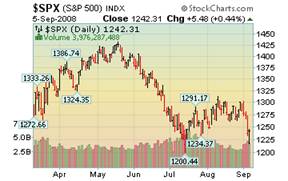 Last week I commented on Mark Hulbert's editorial about the dismal record in the stock market for the month of September. Mark dismissed it as an “act of randomness” with no clear cause for bad performance. I personally see the statistical averages as something to respect and not dismiss as random, just because no clear cause can be identified. This argument may never be resolved by the pundits. I can find just as many advocates of “seasonality” as an effective means of avoiding excessive risk in the market. Remember, “Sell in May and go away?” It is also dismissed as “bunk” by the press. Yet it was good advice indeed, this year.
Last week I commented on Mark Hulbert's editorial about the dismal record in the stock market for the month of September. Mark dismissed it as an “act of randomness” with no clear cause for bad performance. I personally see the statistical averages as something to respect and not dismiss as random, just because no clear cause can be identified. This argument may never be resolved by the pundits. I can find just as many advocates of “seasonality” as an effective means of avoiding excessive risk in the market. Remember, “Sell in May and go away?” It is also dismissed as “bunk” by the press. Yet it was good advice indeed, this year.
Are treasury bonds reversing down?
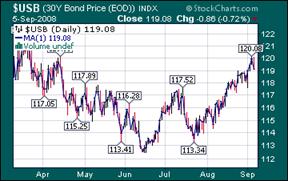 Treasury 10-year notes headed for the biggest weekly gain since February after a government report showed the economy lost jobs in August for the eighth consecutive month, increasing speculation the Federal Reserve will cut rather than raise interest rates.
Treasury 10-year notes headed for the biggest weekly gain since February after a government report showed the economy lost jobs in August for the eighth consecutive month, increasing speculation the Federal Reserve will cut rather than raise interest rates.
However, treasuries reversed later today, as speculation abounds that the U.S. Treasury is about to cobble together a plan to bail out Fannie and Freddie. Yields climbed after the Wall Street Journal reported that the Treasury Department could announce a plan as early as this weekend. This may lessen the appeal of Treasuries as a safe haven. The chart pattern in bonds says, “Be careful!”
Where is your exit strategy?
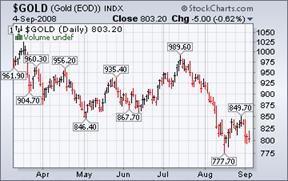 Gold headed for its first weekly drop in three as the dollar strengthened against the euro, curbing demand for the metal as an alternative investment. A morning rally failed to gain traction as overseas investors sold off. The London Metals Exchange is looking at trading gold bullion, but hasn't made a decision on it. All of these comments are spurring hope that the gold market may revive. However, the big picture must include some very large hedge funds that are liquidating their positions and, in the case of Ospraie Fund , closing out altogether after heavy losses in the commodity markets. It's easy to get on a train when it is running well, but hard getting off. If long gold, do you have an exit strategy?
Gold headed for its first weekly drop in three as the dollar strengthened against the euro, curbing demand for the metal as an alternative investment. A morning rally failed to gain traction as overseas investors sold off. The London Metals Exchange is looking at trading gold bullion, but hasn't made a decision on it. All of these comments are spurring hope that the gold market may revive. However, the big picture must include some very large hedge funds that are liquidating their positions and, in the case of Ospraie Fund , closing out altogether after heavy losses in the commodity markets. It's easy to get on a train when it is running well, but hard getting off. If long gold, do you have an exit strategy?
The Japanese are better holding cash.
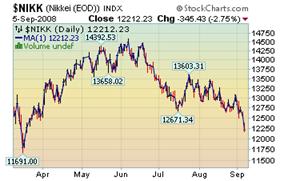 Japan's stocks tumbled, capping the worst weekly slump in a year, as the slowing global economy dragged down U.S. employment and compelled domestic companies to reduce capital spending.
Japan's stocks tumbled, capping the worst weekly slump in a year, as the slowing global economy dragged down U.S. employment and compelled domestic companies to reduce capital spending.
``It's become much clearer to everybody that the U.S. is entering a recession, but it's also quite likely the European economy will slow,'' said Hiroshi Morikawa , a senior strategist at MU Investments Co., which manages about $14 billion. ``It's as though we are losing two pillars. Investors are better off holding cash rather than stocks.'' An astute comment.
The losing streak continues in China…
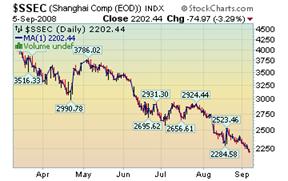 China's stocks fell, dragging the benchmark index to a sixth weekly decline , on concern the global slowdown will dent profits. Central bank efforts to cool inflation have driven the CSI 300 down 59 percent this year, making it the world's worst performing stock market, and deflated a stocks boom that drove the gauge up sevenfold in the two years through 2007. After having rallied seven-fold in the two previous years, the Shanghai Index is a great lesson that trends don't go forever.
China's stocks fell, dragging the benchmark index to a sixth weekly decline , on concern the global slowdown will dent profits. Central bank efforts to cool inflation have driven the CSI 300 down 59 percent this year, making it the world's worst performing stock market, and deflated a stocks boom that drove the gauge up sevenfold in the two years through 2007. After having rallied seven-fold in the two previous years, the Shanghai Index is a great lesson that trends don't go forever.
The U.S. Dollar climbs a wall of worry.
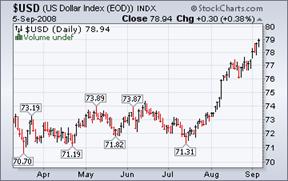 The U.S. dollar is again stronger this morning, jumping to an 11-month high versus a basket of major currencies. Weakness in other major countries and lower commodity prices pushed the dollar higher. The worry level is still very high regarding the dollar. They are correlating the dollar to worsening conditions in our economy. What many do not understand is, this is precisely why the dollar is strengthening. The banking and real estate crisis are drawing liquidity out of our economic system, making the dollar more scarce and, therefore, more valuable.
The U.S. dollar is again stronger this morning, jumping to an 11-month high versus a basket of major currencies. Weakness in other major countries and lower commodity prices pushed the dollar higher. The worry level is still very high regarding the dollar. They are correlating the dollar to worsening conditions in our economy. What many do not understand is, this is precisely why the dollar is strengthening. The banking and real estate crisis are drawing liquidity out of our economic system, making the dollar more scarce and, therefore, more valuable.
The meltdown resumes.
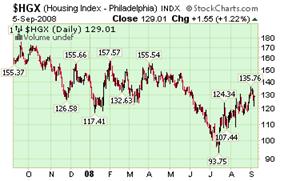 Did you know that there are 15, 551 foreclosed homes for sale on Countrywide Home Loan's website? Check it out. Sheila Bair anticipated the mortgage crisis long before most other regulators. But she never dreamed it would wreak so much havoc on so many banks.
Did you know that there are 15, 551 foreclosed homes for sale on Countrywide Home Loan's website? Check it out. Sheila Bair anticipated the mortgage crisis long before most other regulators. But she never dreamed it would wreak so much havoc on so many banks.
More than a year after the credit crisis first flared, Bair, the chairwoman of the Federal Deposit Insurance Corp., warned last week that the outlook for the ailing banking industry was bad - and getting worse.
A happy outcome for petroleum prices.
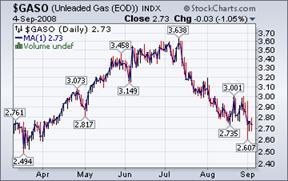 The Energy Information Administration reports that, “ Early indications point to the petroleum supply system fairing much better after Hurricane Gustav than after the Katrina/Rita Hurricanes in 2005. However, damage assessments are not complete, power must be restored, and restarting the petroleum system takes some time.” Hurricane fears seem to have run up the price per barrel of oil by $3.00 to $5.00, but prices quickly abated when it was reported that oil could be released from the Strategic Petroleum reserves and storm damage was reported to be minimal.
The Energy Information Administration reports that, “ Early indications point to the petroleum supply system fairing much better after Hurricane Gustav than after the Katrina/Rita Hurricanes in 2005. However, damage assessments are not complete, power must be restored, and restarting the petroleum system takes some time.” Hurricane fears seem to have run up the price per barrel of oil by $3.00 to $5.00, but prices quickly abated when it was reported that oil could be released from the Strategic Petroleum reserves and storm damage was reported to be minimal.
Gustav wasn't the bully we expected!
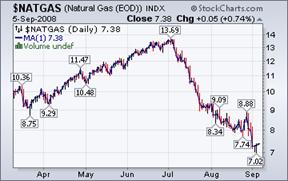 The Energy Information Agency's Natural Gas Weekly Update tells. “ Prices fell heading into the Labor Day holiday weekend, despite the countervailing effects of multiple hurricane threats and shut-in production in the Gulf of Mexico of about 7 Bcf per day. Prices declined following the release of the EIA Weekly Natural Gas Storage Report on Thursday, August 28, which reported an implied net injection of 102 Bcf, significantly exceeding consensus market expectations for the week. Additional factors contributing to the price declines include relatively light cooling demand for natural gas, falling crude oil prices, and a robust natural gas supply situation.”
The Energy Information Agency's Natural Gas Weekly Update tells. “ Prices fell heading into the Labor Day holiday weekend, despite the countervailing effects of multiple hurricane threats and shut-in production in the Gulf of Mexico of about 7 Bcf per day. Prices declined following the release of the EIA Weekly Natural Gas Storage Report on Thursday, August 28, which reported an implied net injection of 102 Bcf, significantly exceeding consensus market expectations for the week. Additional factors contributing to the price declines include relatively light cooling demand for natural gas, falling crude oil prices, and a robust natural gas supply situation.”
Is the CPI overstated?
Most pundits will tell you that the CPI is understated. Why? …Because the price of food and fuel are omitted. There is an even larger item that is omitted… the cost of home ownership. By switching from ownership to rents, the Bureau of Economic Analysis has taken out the rising cost of home ownership from 2001 to 2005, but has also omitted the declining cost of ownership from 2005 to the present. This is a much larger share of the cost of living, and would have alerted us much earlier to the problem of inflation, when it was still small. This has also altered the way we perceive the issues of inflation versus deflation. Read Mish's recent article . It has some fascinating insights.
We're on the air every Friday.
Tim Wood of www.cyclesman.com , John Grant and I are back in our weekly session on the markets. This week we debate what the market is telling us, near-term. It should be fascinating. You will be able to access the interview by clicking here .
New IPTV program going strong.
This week's show on www.yorba.tv is packed with information about the direction of the markets. I'm on every Thursday at 4:00 pm EDT . You can find the archives of my latest programs by clicking here .
Please make an appointment to discuss our investment strategies by calling Claire or Tony at (517) 699-1554, ext 10 or 11. Or e-mail us at tpi@thepracticalinvestor.com .
Anthony M. Cherniawski,
President and CIO
http://www.thepracticalinvestor.com
As a State Registered Investment Advisor, The Practical Investor (TPI) manages private client investment portfolios using a proprietary investment strategy created by Chief Investment Officer Tony Cherniawski. Throughout 2000-01, when many investors felt the pain of double digit market losses, TPI successfully navigated the choppy investment waters, creating a profit for our private investment clients. With a focus on preserving assets and capitalizing on opportunities, TPI clients benefited greatly from the TPI strategies, allowing them to stay on track with their life goals
Disclaimer: The content in this article is written for educational and informational purposes only. There is no offer or recommendation to buy or sell any security and no information contained here should be interpreted or construed as investment advice. Do you own due diligence as the information in this article is the opinion of Anthony M. Cherniawski and subject to change without notice.
Anthony M. Cherniawski Archive |
© 2005-2022 http://www.MarketOracle.co.uk - The Market Oracle is a FREE Daily Financial Markets Analysis & Forecasting online publication.


